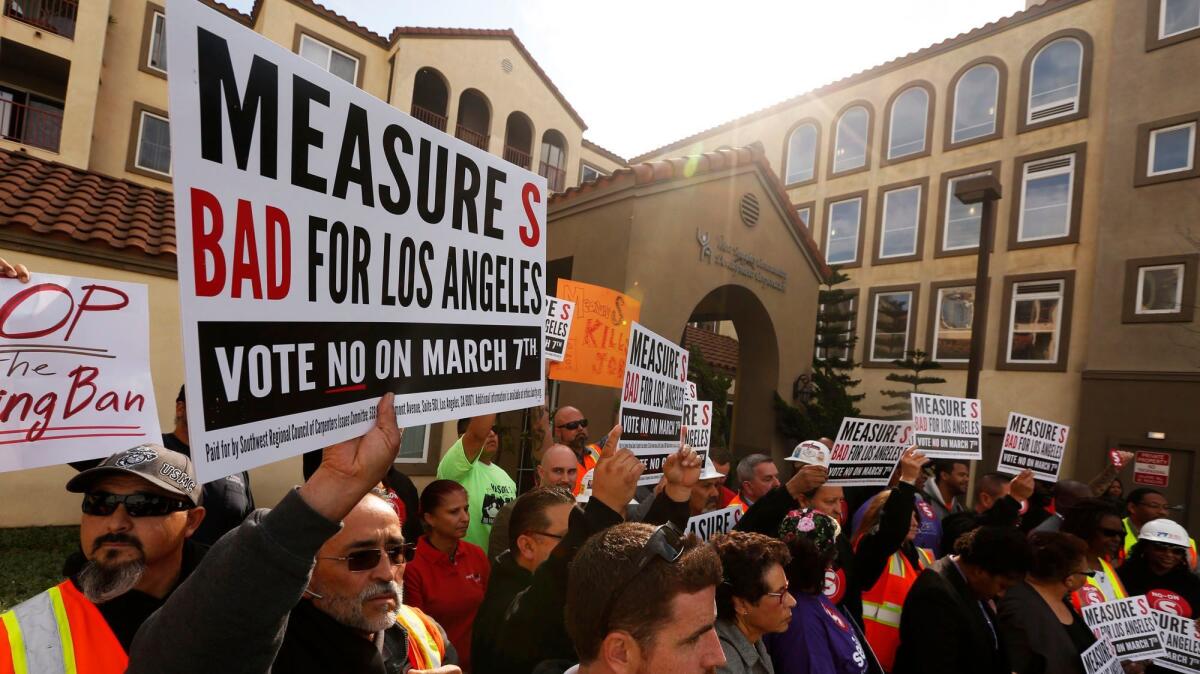After Measure S, some L.A. developers say they’ll step more softly with new projects

- Share via
As the city debated slow-growth Measure S, developer Century West Partners refused to buy land that would need special exemptions to build, fearful the two-year moratorium on such projects would pass.
This week, the Los Angeles initiative went down to a resounding defeat at the polls, losing by more than a 2-to-1 margin. Now if a broker called with such a deal, Century West may bite.
“We are going to answer the phone,” said Kevin Farrell, the chief operating officer of Century West, which has built about 1,000 housing units in Los Angeles over the last four years.
But Farrell and other developers said they aren’t taking the vote as a mandate to go on an acquisition and building spree. Instead, they said voters simply rejected an “extreme” measure amid a housing shortage — but one that exposed deep resentment among Los Angeles residents.
“It reminds us to step carefully,” Farrell said.
Going forward, he and others said they’d more carefully scrutinize potential deals to ensure the community and the local City Council member is on board, especially for developments that need council approval.
In part, that’s because council members themselves are likely to looker closer after an uproar from some of their constituents, said Bob Champion, a Los Angeles developer currently asking for a zoning change to build a large mixed-use complex in Hollywood that would require the demolition of rent-controlled apartments.
Champion said he agreed before the Measure S vote to allow existing tenants the option to live at his new project at Yucca Street and Argyle Avenue at their current rents. He also said that while the project is being built, he would pay the difference between tenants’ current rent and the rent at whatever temporary place they find in the area.
He said he sees such an offer as a model going forward if he proposes a similar project.
“The truth is every council district is run by the councilman and the councilman has the ultimate ability to fight any projects,” Champion said. “I don’t think the failure of Measure S meant that people want more density.”
But more density is exactly what many in the business community believe Los Angeles needs to thrive.
Measure S “got walloped and that was the fate it deserved,” said longtime developer and Los Angeles Police Commissioner Steve Soboroff. “You don’t put our economy on moratorium.”
Shiraz Tangri, a land-use attorney with Meyers Nave, said most people understand development equals more jobs and more housing. He said politicians can point to the vote as a way to support policies that would allow increased density as a way to ease the housing crunch.
“Southern California understands we got to build our way out of this,” he said.
How much of that is true is hard to know, even though the debate over Measure S became one that pitted a taller, denser future against a more suburban ideal. A day after the election, the Los Angeles County registrar of voters said turnout in the city was likely the lowest ever recorded.
Still, the uncertainty over what will be welcomed both by politicians and the community is something developers said they want to end. It’s also something Measure S attempted to address.
The initiative would have placed a two-year moratorium on zone changes or height district changes, while permanently barring, for individual projects, general plan amendments typically needed for a land-use change such as building homes in a manufacturing district.
Proponents of the measure said the City Council too often approved such exemptions for deep-pocketed campaign contributors who wanted to build out-of-scale luxury developments. Opponents countered the moratorium and amendment ban would slash housing construction of all types, jacking up home prices and rents in the process.
But the moratorium was also designed to push the city to update its outdated community plans, 35 documents that govern what can be built and where. Most are more than 15 years old and developers say that’s why they often need exemptions for projects that are economically viable today.
Real estate broker Mark Tarczynski of Collliers International, who helps developers get city approval for projects, said Measure S was too far-reaching, “like taking a sledge hammer to kill a fly.”
It did, however, illuminate how important it is that the city update its zoning codes “so developers wouldn’t have to go into a council person’s office on bended knee and pray for his support.”
Shortly before the election, the City Council raced to start updating the plans, aiming to have each done by 2024. Both proponents of Measure S and developers say they want the council to follow through on that goal, though many who rallied around the measure probably would disagree with the community plans sought by business groups.
But Farrell of Century West said builders want that battle settled at the community plan level, not when individual projects arise.
“Nothing is better for us than having a fully vetted community plan that’s been through the war and everyone’s weighed in,” he said. “That is all we can ask. We don’t go in and buy a site to pick a fight.”
Developer Sonny Astani, who has built about 7,500 apartments and has three projects underway, said he also hopes the failed measure will spur an update of community plans so that developers can color within those lines and avoid lawsuits.
“The tumor is still there,” Astani said. “The opposition has woken up so now we have to make truce. We’ve got to sit down and work with planners to get something that works for everyone.”
More to Read
Inside the business of entertainment
The Wide Shot brings you news, analysis and insights on everything from streaming wars to production — and what it all means for the future.
You may occasionally receive promotional content from the Los Angeles Times.









